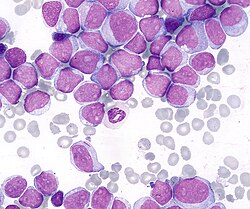News release
From:
New discovery reveals potential new target for treating aggressive blood cancers
Researchers at Peter Mac have discovered a key weakness in aggressive blood cancers like acute myeloid leukaemia (AML), opening up a promising new avenue for treatment.
In research published in Molecular Cell, scientists in the laboratory led by Professor Ricky Johnstone identified a protein called Cyclin-Dependent Kinase 11 (CDK11) as a critical regulator of gene expression in cancer cells.
The research reveals that this protein acts like a checkpoint for whether certain genes are switched on or off, helping cancer cells survive, grow, and resist treatment.
The team showed that blocking CDK11 disrupts this process, leading to rapid AML cell death. Importantly, they also found that an experimental drug targeting CDK11 can effectively kill blood cancer cells in pre-clinical models of human AML.
“Cancer cells are masters of hijacking normal gene control,” said senior author Professor Ricky Johnstone, Executive Director of Cancer Research at Peter Mac.
“Our study shows that CDK11 is a crucial player in this process and without it, aggressive blood cancer cells can't survive.
“This potentially opens up a whole new strategy to treat these hard-to-treat cancers,” he said.
The findings provide important new insights into how gene expression is controlled in cancer.
“Unlike healthy cells, cancer cells rely heavily on certain pathways to keep growing and this study pinpoints CDK11 as one such ‘Achilles heel’,” said lead author Dr Jennifer Devlin.
“This research gives us a new angle on how we approach killing aggressive blood cancers like AML.
“By targeting CDK11, we may be able to switch off the genes that cancer cells need to survive, without harming normal cells.”
The research team now hopes to explore how drugs targeting CDK11 could be developed further with the aim of eventually entering clinical trials.
This breakthrough underscores the power of fundamental research in uncovering new targets for cancer therapies and brings fresh hope to patients facing aggressive blood cancers with limited treatment options.
More than 1000 people are diagnosed with AML in Australia each year, with a five-year survival rate of just 30%.



 Australia; VIC
Australia; VIC


